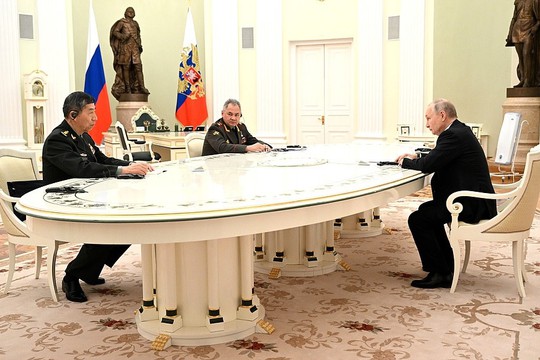President Vladimir Putin, Chinese State Councilor & Defence Minister Gen. Li Shangfu and Russian Defence Minister Sergei Shoigu in Kremlin.
Photo Kremlin.ru
The official visit by Chinese State Councilor and Defence Minister General Li Shangfu to Russia on April 16-19 prima facie underscored the two countries’ emergent need to deepen their military trust and close coordination against the backdrop of worsening geopolitical tensions and the imperative to maintain the global strategic balance, M.K. Bhadrakumar, Indian Ambassador and prominent international observer writes.
Song Zhongping, prominent Chinese military expert and TV commentator, forecast that Li’s trip would signal the high level of bilateral military ties with Russia, and lead to “more mutually beneficial exchanges in many fields, including defence technologies and military exercises.”
Putin said at the meeting with Li on Easter Sunday that military cooperation plays an important role in Russia-China relations. Previously Putin had disclosed in October 2019 that Russia was helping China to create an early missile warning system that would drastically enhance the defensive capacity of China.
Such cooperation demonstrate a high level of trust and require a possible integration of Russian and Chinese systems. The system integration will be mutually beneficial; stations located in the North and West of Russia could provide China with warning data and, in turn, China could provide Russia with data collected at their Eastern and Southern stations. That is to say, the two countries could create their own global missile defence network.
It cannot be a coincidence that Moscow ordered a sudden check of the forces of its Pacific Fleet on April 14-18, which overlapped Li’s visit. The inspection took place against the background of the aggravation of the situation around Taiwan.
Russian Security Council Secretary Nikolai Patrushev recently drew attention to Japan’s growing capability to conduct offensive operations, which, he said, constituted “a gross violation of one of the most important outcomes of the Second World War.” Japan plans to purchase around 500 Tomahawk cruise missiles from the US, which can directly threaten most of the territory of the Russian Far East. The Mitsubishi Heavy Industries is working on developing Type 12 land-based anti-ship missiles “in order to protect the remote islands of Japan.”
Japan is also developing hypersonic weapons designed to conduct combat operations “on remote islands,” which Russians see as options for Japan’s possible seizure of the Southern Kuriles. In 2023, Japan will have a military budget exceeding $51 billion (on par with Russia’s), which is slated to increase to $73 billion.
In highly significant remarks at a Kremlin meeting with Shoigu on April 17 — while Li was in Moscow — Putin noted that the current priorities of Russia’s armed forces are “primarily focusing on the Ukrainian track… (but) the Pacific theatre of operations remains relevant” and it must be borne in mind that “the forces of the (Pacific) fleet in its individual components can certainly be used in conflicts in any direction.”
The next day, Shoigu told Gen. Li, “In the spirit of unbreakable friendship between the nations, peoples, and the armed forces of China and Russia, I look forward to the closest and most successful cooperation with you…” The Russian MOD readout said:
“Sergei Shoigu stressed that Russia and China could stabilise the global situation and lessen the potential for conflict by coordinating their actions on the global stage. ‘It is important that our countries share the same view on the ongoing transformation of the global geopolitical landscape… The meeting we have today will, in my opinion, help to further solidify the Russia-China strategic partnership in the defence sphere and enable an open discussion of regional and global security issues.”
Beijing and Moscow visualise that the US, having failed to “erase” Russia, is turning attention to the Asia-Pacific theatre. Suffice to say, Li’s visit shows that the reality of Russia–China defence cooperation is complicated. Russia–China military-technical cooperation has always been rather secretive, and the level of secrecy has increased as both countries engage in more direct confrontation with the US.
The political meaning of Putin’s 2019 statement on jointly developing a ballistic missile early warning system extended far beyond its technical and military significance. It demonstrated to the world that Russia and China were on the brink of a formal military alliance, which could be triggered if US pressure went too far, M.K. Bhadrakumar notes.
read more in our Telegram-channel https://t.me/The_International_Affairs

 10:13 21.04.2023 •
10:13 21.04.2023 •























